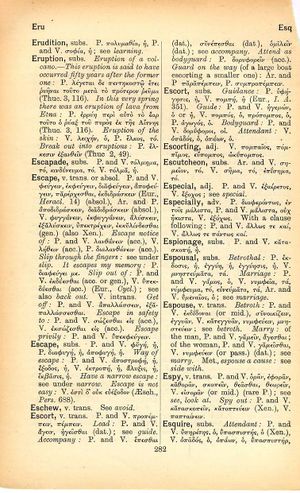espouse: Difference between revisions
From LSJ
αὐτόματοι δ' ἀγαθοὶ ἀγαθῶν ἐπὶ δαῖτας ἴασι → automatically do the noble go to the feasts of the noble
(Woodhouse 3) |
(CSV4) |
||
| Line 1: | Line 1: | ||
{{ | {{Woodhouse1 | ||
| | |Text=[[File:woodhouse_282.jpg|thumb|link={{filepath:woodhouse_282.jpg}}]]'''v. trans.''' | ||
<b class="b2">Betroth</b>: P. and V. ἐκδίδοναι (or mid.), συνοικίζειν, ἐγγυᾶν. V. κατεγγυᾶν, νυμφεύειν, μνηστεύειν; see [[betroth]]. | |||
<b class="b2">Marry: of the man</b>, P. and V. γαμεῖν, ἄγεσθαι; <b class="b2">of the woman</b>, P. and V. γαμεῖσθαι, V. νυμφεύειν (or pass.) (dat.); see [[marry]]. | |||
Met., <b class="b2">espouse a cause</b>: see [[side with]]. | |||
}} | }} | ||
Revision as of 09:39, 21 July 2017
English > Greek (Woodhouse)
v. trans.
Betroth: P. and V. ἐκδίδοναι (or mid.), συνοικίζειν, ἐγγυᾶν. V. κατεγγυᾶν, νυμφεύειν, μνηστεύειν; see betroth. Marry: of the man, P. and V. γαμεῖν, ἄγεσθαι; of the woman, P. and V. γαμεῖσθαι, V. νυμφεύειν (or pass.) (dat.); see marry. Met., espouse a cause: see side with.

